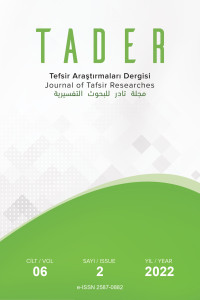Imam al-Māturīdī’s Criticism Against al-Mu‘tazila in Taʾwīlāt al-Qurʾān, author Esat Sabır-lı (Istanbul: Insan Publications. 1. Edition, 2021), 406 page, ISBN 9786057406620.
Abstract
The book titled "İmam al-Māturīdī's Criticism Against al-Mu'tazila in Taʾvīlāt al-Qurʾan" is a partial addition to the doctoral thesis titled "The Critique of Mu'tazila Discourse in Imam al-Māturīdī's Taʾvīlāt al-Qurʾan Exegesis" completed by Sabırlı in 2021. It is a book form with subtraction and editing. Pointing to the important position of the sectarian debates and the culture of criticism in the tafsir literature in the preface, Sabırlı aimed to examine al-Māturīdī's criticisms of Mu'tazila in the context of understanding and interpretation of the Qur'an, thus revealing the separation ground between the tafsir paradigms of al-Māturīdī and Mu'tazila discourse. . The study also aimed to determine the projections of the Ahl al-Sunnah-al-Mu'tazila division in tafsir. Another aim of the research is to shed light on the traces of the evolution of content in the tafsir works, in particular with al-Māturīdī' and Mu‘tazilite interpretations. Because the fact that al-Māturīdī' and Mu'tazilî scholars included a very intense level of theological content in their works played an important role in the process of transferring theological issues to tafsir books and interpreting these issues. At the same time, Sabırlı wishes to test whether the discourses that position al-Māturīdī on the basis of rationality at a higher level than Mu‘tazila correspond to a genuine reality. In terms of the content of the work, it will contribute to the researchers of tafsir who are interested in the "relationship of theology", "the sectarian commentary" and "the tradition of criticism in tafsir". The method followed in the work contains remarkable points in terms of how people who will conduct research on the early period can follow. The language of the work, which is far from judgmental and humiliating attitudes, also provides examples that will help to overcome the difficulty of exhibiting a scientific style in comparative studies. It is not possible for a reader to answer the question of what sect the author belongs to and whether his sectarian affiliation affects his evaluations in the study, who mostly finds al-Māturīdī's view correct. At least, it is clear and sufficient for the readers that he did not use expressions containing bias and sentimentality while appreciating Sabırlı al-Māturīdī's views. It should also be noted that the work has a very plain and fluent style. In our opinion, researchers of tafsir who do not have the acquis on the science of kalam can easily read and understand the work.
Keywords
References
- Gedikli, Fikret. Te’vîlâtü Ehli’s-Sünne’de Mâtürîdî’nin Mu‘tezile Eleştirisi. Ankara: İlahiyat Yayınları, 2021.
- Sabırlı, Esat. “Mu‘tezile’nin Kur’ân Yorumuna İmam Mâtürîdî’nin Muhalefet Gerekçeleri”. Şırnak Üniversitesi İlahiyat Fakültesi Dergisi 26 (Haziran 2021), 91-119.
Teʾvîlâtü’l-Kurʾân’da İmam Mâtürîdî’nin Mu‘tezile Eleştirisi, yazar Esat Sabırlı (İstan-bul: İnsan Yayınları, 1. Baskı, 2021), 406 Sayfa, ISBN 9786057406620.
Abstract
Teʾvîlâtü’l-Kurʾân’da İmam Mâtürîdî’nin Mu‘tezile Eleştirisi başlıklı kitap Sabırlı tarafından 2021 yılında tamamlanan “İmam Mâtürîdî’nin Te’vîlâtü’l-Kur’ân İsimli Tefsirinde Mu’tezilî Söylemin Eleştirisi” başlıklı doktora tezinin kısmî ekleme-çıkarma ve düzenlemelerle kitaplaştırılmış formudur. Önsözde mezhebi tartışmaların ve eleştiri kültürünün tefsir literatüründeki mühim pozisyonuna işaret eden Sabırlı, Mâtürîdî’nin Mu‘tezile’ye yönelttiği eleştirileri Kur’ân’ın anlaşılması ve yorumlanması bağlamında incelemeyi, böylece Mâtürîdî ile Mu‘tezilî söylemin tefsir paradigmaları arasındaki ayrışma zeminini ortaya koymayı amaçlamıştır. Çalışma Ehli Sünnet-Mu‘tezile ayrışmasının tefsirdeki izdüşümlerini tespit etmeyi de hedeflemiştir. Araştırmanın bir diğer gayesi de Mâtürîdî ve Mu‘tezilî yorumlar özelinde, tefsir eserlerinde kelâma doğru yönelen içerik evrilmesinin izlerinin takibine ışık tutmaktır. Zira Mâtürîdî ve Mu‘tezilî âlimlerin, eserlerinde çok yoğun bir düzeyde kelâmî muhtevaya yer vermeleri, kelâmî meselelerin tefsir kitaplarına taşınması ve bu meselelerin adeta tefsirleşmesi sürecinde önemli bir rol oynamıştır. Sabırlı aynı zamanda, Mâtürîdî’yi akılcılık temelinde Mu‘tezile’den daha ileri bir düzeyde konumlandıran söylemlerin sahici bir gerçekliğe tekabül edip etmediğini test etme arzusundadır. Eser içeriği itibariyle “Kelam tefsir ilişkisi”, “mezhebi tefsir” ve “tefsirde eleştiri geleneği” konularına ilgi duyan tefsir araştırmacılarına katkı sunacak niteliktedir. Eserde izlenen yöntem, erken döneme dair araştırma yapacak kimselerin nasıl bir yol izleyebileceği noktasında dikkate değer noktalar barındırmaktadır. Eserin yargılayıcı ve aşağılayıcı tavırlardan oldukça uzak olan dili de mukayese içeren araştırmalarda ilmi bir üslup sergileme zorluğunu aşmaya yardımcı olacak örnekler sunmaktadır. Çoğunlukla Mâtürîdî’nin görüşünü isabetli bulan yazarın ait olduğu mezhebin ne olduğu ve mezhebi aidiyetinin çalışmadaki değerlendirmelerine etki edip etmediği sorusunun bir okur tarafından cevaplanması mümkün değildir. En azından şu açıktır ve okurlar için yeterlidir ki, Sabırlı Mâtürîdî’nin görüşlerini takdir ederken tarafgirlik ve duygusallık içeren ifadeler kullanmamıştır. Çalışmanın oldukça yalın ve akıcı bir üsluba sahip olduğu da belirtilmelidir. Kanaatimizce kelâm ilmine dair müktesebatı olmayan tefsir araştırmacıları eseri kolayca okuyup anlayabilir.
Keywords
References
- Gedikli, Fikret. Te’vîlâtü Ehli’s-Sünne’de Mâtürîdî’nin Mu‘tezile Eleştirisi. Ankara: İlahiyat Yayınları, 2021.
- Sabırlı, Esat. “Mu‘tezile’nin Kur’ân Yorumuna İmam Mâtürîdî’nin Muhalefet Gerekçeleri”. Şırnak Üniversitesi İlahiyat Fakültesi Dergisi 26 (Haziran 2021), 91-119.
Details
| Primary Language | Turkish |
|---|---|
| Subjects | Religious Studies |
| Journal Section | KİTAP DEĞERLENDİRMESİ |
| Authors | |
| Early Pub Date | October 27, 2022 |
| Publication Date | October 30, 2022 |
| Submission Date | February 10, 2022 |
| Acceptance Date | March 21, 2022 |
| Published in Issue | Year 2022 Volume: 6 Issue: 2 |


